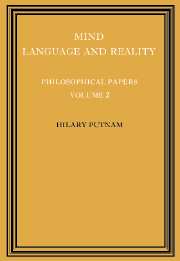Book contents
- Frontmatter
- Contents
- Dedication
- Introduction
- 1 Language and philosophy
- 2 The analytic and the synthetic
- 3 Do true assertions correspond to reality?
- 4 Some issues in the theory of grammar
- 5 The ‘innateness hypothesis’ and explanatory models in linguistics
- 6 How not to talk about meaning
- 7 Review ofThe concept of a person
- 8 Is semantics possible?
- 9 The refutation of conventionalism
- 10 Reply to Gerald Massey
- 11 Explanation and reference
- 12 The meaning of ‘meaning’
- 13 Language and reality
- 14 Philosophy and our mental life
- 15 Dreaming and ‘depth grammar’
- 16 Brains and behavior
- 17 Other minds
- 18 Minds and machines
- 19 Robots: machines or artificially created life?
- 20 The mental life of some machines
- 21 The nature of mental states
- 22 Logical positivism and the philosophy of mind
- Bibliography
- Index
4 - Some issues in the theory of grammar
Published online by Cambridge University Press: 12 January 2010
- Frontmatter
- Contents
- Dedication
- Introduction
- 1 Language and philosophy
- 2 The analytic and the synthetic
- 3 Do true assertions correspond to reality?
- 4 Some issues in the theory of grammar
- 5 The ‘innateness hypothesis’ and explanatory models in linguistics
- 6 How not to talk about meaning
- 7 Review ofThe concept of a person
- 8 Is semantics possible?
- 9 The refutation of conventionalism
- 10 Reply to Gerald Massey
- 11 Explanation and reference
- 12 The meaning of ‘meaning’
- 13 Language and reality
- 14 Philosophy and our mental life
- 15 Dreaming and ‘depth grammar’
- 16 Brains and behavior
- 17 Other minds
- 18 Minds and machines
- 19 Robots: machines or artificially created life?
- 20 The mental life of some machines
- 21 The nature of mental states
- 22 Logical positivism and the philosophy of mind
- Bibliography
- Index
Summary
Introduction
Although this symposium is devoted to problems in the field of mathematical linguistics (a peculiar field, in that some of its leading experts doubt its existence), in my paper I am not going to attempt to prove any theorems or state any results. Rather, I shall take advantage of my privilege as a philosopher and devote myself to a survey of work done by others in the area and to a discussion of issues raised by linguists concerning the work done in this area. There are, in addition to the difficult technical problems, whose existence everyone acknowledges, also very serious conceptual difficulties, as is shown by the fact that Chomsky's book Syntactic Structures, which is regarded by some as a foundation-stone for this kind of activity, has been described by no less an authority than Roman Jakobson as an argumentum a contrario (Jakobson, 1959), showing the impossibility of the whole enterprise.
What I want to do first is to provide, so to speak, a conceptual setting for the kind of work that Chomsky is doing. I believe that the conceptual setting I will provide is one that will be acceptable to Chomsky himself – but this, of course, is not vital. The interpretations of a scientific theory most acceptable to the scientist himself may often be the least tenable ones, and so we shall worry about finding an interpretation or conceptual setting, for the theory of grammars which seems to us to be correct, not necessarily one which some particular linguist will ratify.
- Type
- Chapter
- Information
- Philosophical Papers , pp. 85 - 106Publisher: Cambridge University PressPrint publication year: 1975
- 1
- Cited by



